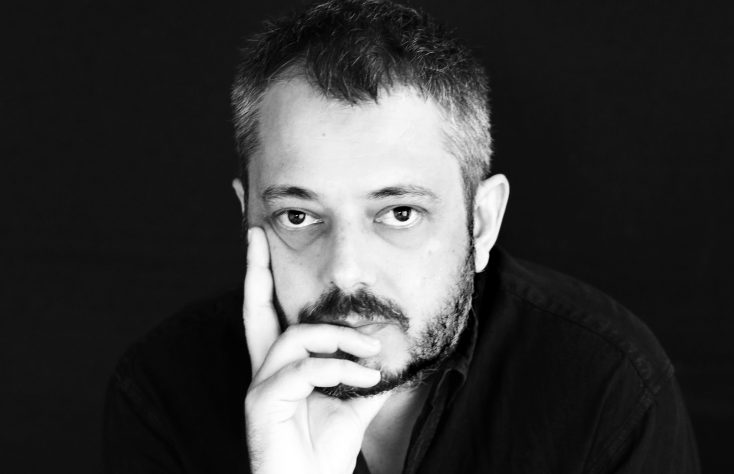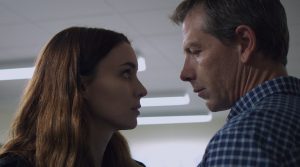By ANGELA DAWSON
Front Row Features
HOLLYWOOD—It’s not often that a director has an opportunity to revisit a work in a different medium but that is just what has happened with Benedict Andrews, a veteran theater director who has brought the provocative play “Blackbird” to the big screen as his debut feature.
By phone from New York, Andrews, who is based in Reykjavik, spoke about working with playwright David Harrower to bring the story of an emotionally damaged young woman who confronts the man who seduced her as a youngster and then abandoned her after their illicit affair. The film, titled “Una,” stars Rooney Mara (“The Girl with the Dragon Tattoo,” “The Social Network”) and Ben Mendelsohn (“Animal Kingdom,” “Rogue One: A Star Wars Story”) as the duo in conflict as they sort out their past at his workplace. Andrews had directed a stage version of the story in German more than a decade ago, so he was intimately familiar with the nuances of the plot and characters but he also wanted the film to be its own different animal. He spoke about revisiting the material, working with his small but exceptional cast and delving into his first film feature, which turned out to be a welcome learning experience.
Q: You had directed a stage version of “Blackbird” several years ago, so was it in the back of your mind to adapt it into a film?
Andrews: I’ve worked as a theater director for all of my adult life. I’ve had the great privilege to work on a number of great plays with extraordinary actors in the theater. For a long time, I’ve been wanting to make my first film. I’d been attached to a couple of projects when I lived in Australia and, for various reasons, I’d never been able to blast a hole in my theater schedule or find the right project to do that. I directed “Blackbird” in German in 2005. Around 2008, I inquired about the (film) rights to “Blackbird,” but they were unavailable. Later, it came across my desk and producer Jean Doumanian, who also produces theater, knew of my work and we kind of set off from there.
I’d always been fascinated by its cinematic potential—the raw encounter between these two people, with all of the baggage of their past. That works one way in the theater as a verbal boxing match between two people, locked in the same room. But I was fascinated to see how the camera might be able to achieve a special intimacy in that relationship but also how the cinema might be able to open up a different space of silence in their relationship and different way of exploring the effects of time and memory.
I’d done the work almost 10 years before. I spent two months with German actors in rehearsal digging into this play, so when David Harrower, the writer, came up to Reykjavik and we began working on the screenplay together, I felt I already knew (the work) inside out. I already had it in my bones, and it was a good place to begin. I really didn’t look backwards. I had an understanding of it inside me, so the question for David and me became, “How does this not become a faithful filmed version of the play? How does it go through a transformation to become a film?” That was important to both of us.
Q: Was Rooney Mara someone you had in mind for Una from the start?
Andrews: She was absolutely the first person I had in mind from the get-go. There’s something about her combination of fierce intelligence, beguiling beauty, and the ways in various performances she’s willing to really go all the way and show her raw nerve and put herself on the line. I knew we needed that for Una. I also knew we needed someone that the audience would be fascinated by without feeling that they could entirely know her. They had to always feel that she was a mystery. She’s also one of the most extraordinary and brave actors of her generation.
I discovered that she loved the play. She knew the play. It had been on her radar. So, we began a conversation from there, and it really felt like it was meant to be.
Q: How did you cast Ben Mendelsohn as Ray?
Andrews: The uncomfortable thing about the film—and Una can’t separate in her mind—is that part her thinks he’s a monster and there’s part of her that still has feelings for him. That’s the uncomfortable space that the audience is drawn into. The film would have lost its charge and would have become only a revenge film if (Ray) was only a monster. It would lose its complexity. So, you need a very special actor there and someone who is brave enough to show the vulnerability as well as the manipulative qualities of that person, and to keep both of those things balanced.
I know Ben from having directed him in the theater in Australia and I’ve watched him in incredible performances where he’s been able to shine light into characters’ lives. Sometimes quite dark character. He’s just a very smart and compassionate actor who, like Rooney, (the audience) wants to know more about him. He draws us in, sometimes into uncomfortable places.
This film was always going to be about the chemistry of the meeting of Una and Ray. When you’re casting, you’re always doing kind of a chemical experiment. So, I was very curious with Ben and Rooney and it turned out to be a very special meeting.
Q: Was it a challenge to find an actress to play young Una?
Andrews: Yeah. Not only did we have to find an actress that looked like Rooney but she also had to be an extraordinary actress. We looked at tapes from hundreds of young actresses. We then auditioned many and Ruby Stokes, who plays young Una, was an extraordinary find.
Q: Where did you film this? Did you use an actual warehouse for the main setting?
Andrews: We shot in and around London. The play is set in the U.K., and so we decided to keep it set there for the film. The production designer and I really wanted the warehouse to feel like another character. It would be like a labyrinth in which the characters stalk each other through. I don’t know whether it had to do with the economic climate or because of the sensitive subject of the movie but it was very hard to find a single space that we were able to use. So that warehouse is actually made up of about four or five different locations. We also built some of the sets (on a soundstage) such as the glass breakroom. A lot of the extras you see in the distribution center actually work there, such as in the beginning, when she’s working through the warehouse and there are women packing boxes. We wanted to mix this “street” casting with our actors. Also, in the pub where we shot, many of the (extras) were regulars at that pub. We did that so we’d have an authentic sense of place, while at the same time, almost a dream sense of space, because there’s something feverish about the whole thing that I think comes from the special state that they’re both in. We shot the film rather quickly; something like 26 days.
Q: When you premiered the film at the Telluride Film Festival, were you a bit anxious to see the audience’s reaction because of the film’s delicate subject matter?
Andrews: Yeah. What the film tries to achieve is to stay on a knife-edge and draw people into a place where their moral compass is spinning. Some people want to go to that place and other people do not. The film draws you in to an uncomfortable, claustrophobic relationship with these two people, and that’s part of it. Part of it is power. So, of course, in the first outings, I was curious as to how people would react to that, and I saw people who looked as though their moral compasses were spun. That’s something I look for when I go to the cinema myself. The rewarding thing about taking films to festivals is that I’d see people later on discussing it at a bar or restaurant, especially the ending. Realizing that those discussions are happening with audiences has been very rewarding. It’s not always comfortable and it doesn’t pretend to be a comfortable film. I think there’s also a pleasure for audiences in being challenged like that with storytelling that they can’t step away from immediately. They have to keep talking about it. That’s something I’ve become very proud of.
Q: What did you learn from making this film? What was most challenging for you?
Andrews: Every step of the way was like a baptism by fire for me. I felt as though I was drawing from 20 years of experience as a theater-maker and working with actors and drawing performances out of them, and trying to find the poetry in image. I’d never been in an editing suite or a sound mix. With each phase of it, I felt as though I was learning a new technique. I feel like, with this film, I’ve learned to play my scales, and on my next film I can play a little more freely on the keyboard. But it was a very wonderful experience in which I was surrounded by a great crew and great heads of department. It was a delicious learning experience that gave me a taste for more.
I learned the truism that you make the film three times. Once on the script, on the page; once when you’re shooting it and once in the editing room. I also learned from Jed Kurzel, our composer, that you have to listen to the film. It will tell you what it wants to become. And, I think that was a great take away from it.
Q: The ending is ambiguous and people wonder what happens next to these characters.
Andrews: We deliberately didn’t close the door on these characters. We feel we’ve gone through something with these characters and we’ve seen their lives shaken up. We’ve seen them have to look to places in their lives and relationship that they didn’t necessarily want to look into but they needed to. If it were resolved too easily, we’d be betraying the size of the questions that Una has when she seeks out Ray about what happened to her life. Even David (Harrower, the playwright and screenwriter) and I don’t agree on what happens with these characters next.
Q: What would you like to do next? Would you like to do another adaptation or an original piece?
Andrews: I’m working on something that I can’t talk about yet but it’s an original screenplay from a true story. It’s much more epic in scale. “Una” is very intimate and claustrophobic but my next film will have a bigger canvas. The fact that it’s not from a play is important to me because I will be completely stepping outside of the theater world.






